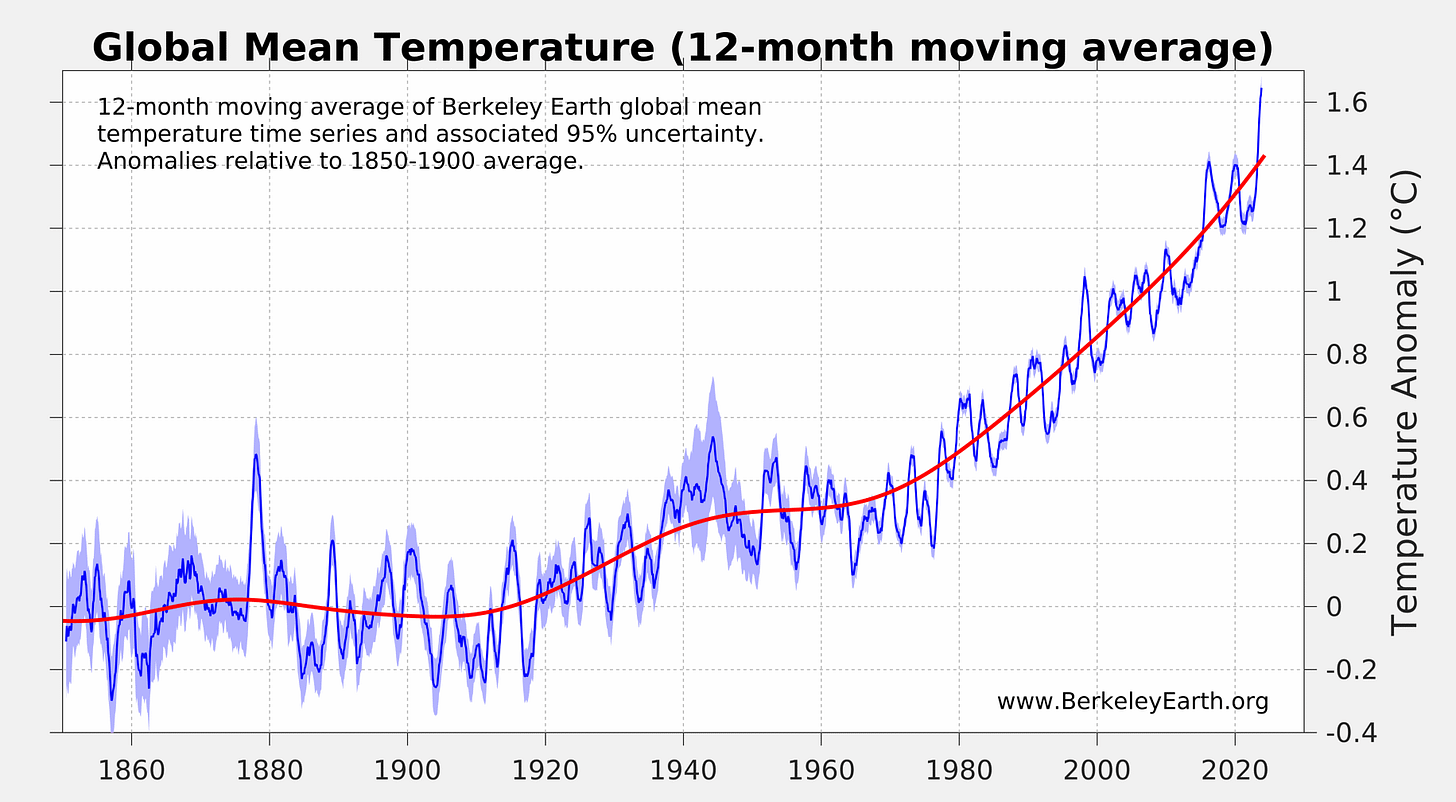Man, it's a hot one.
Roundup - 5/16/24
There are a variety of powerful forces—with a variety of motivations—ostensibly putting a lot hope on mechanical carbon capture becoming viable at scale. As Kate Aronoff writes, this technology is still more hype than savior, and debating the correct amount of hope to have for our planet’s future is a waste of energy that tends to belie political economy and the power struggles at hand. Or, as the late Mike Davis put it, “Fight with hope, fight without hope, but fight absolutely.”
It can be easy to forget that digital technology has a material basis—and therefore an ecological impact. Computers are made from minerals mined from the earth and use water and energy (which of course also requires minerals mined from the earth). The internet is connected by a vast network of cables laid across the sea floor that require regular physical maintenance:
The reason websites continue to load, bank transfers go through, and civilization persists is because of the thousand or so people living aboard 20-some ships stationed around the world, who race to fix each cable as soon as it breaks
And the push for so-called AI, which requires large buildings full of computers running particularly intensive data processing, is hampering Microsoft’s goal of being carbon negative by 2030: according to Bloomberg, the computing giant’s greenhouse gas emissions are now 30% higher than when they set that goal in 2020.
The Farm Bill is the most important legislation you probably do not know much about. Every five years or so, this omnibus food legislation that covers everything from agriculture subsidies to SNAP funding is passed, and the next one is coming up soon. Right now, the Farm Bill is full of terrible policies that form the basis of our unjust and ecologically devastating agriculture system. For the Climate and Community Project, Ryan Ackett wrote an excellent post about the Farm Bill and why we need something radically different.
The loss of ridership from the pandemic dealt a devastating blow to US public transit systems—which, outside of a handful of places, were not that great to begin with—and most have struggled to recover. However, the DC area’s Washington Metropolitan Area Transit Authority (WMATA), led by General Manager and CEO Randy Clarke, has been a great success. They utilized federal aid to expand and improve service, which not only brought back riders but created stronger constituencies to demand permanent funding for this level of service.
This is fantastic reporting on tech oligarch Marc Benioff quietly buying up tons of land in Hawaii, a case study in the undemocratic power and hollow, self-interested philanthropy of thin-skinned billionaires (even “conscientious” ones):
A couple of days before the interview, Benioff texted the same NPR colleague again, asking for intel on my story. Then he called me and demanded to know the title of this piece. During that call, he also mentioned he knew the exact area where I was staying. Unnerved, I asked how he knew, and he said, "It's my job. You have a job and I have a job." During the interview, he brings up more personal details about me and my family.
China has just installed the first grid-scale sodium-ion battery, which could be a game-changer for renewable energy. One way to deal with the intermittency (i.e. the sun does not always shine and the wind does not always blow) of renewable energy is to utilize large batteries to store energy for later use. Right now, the lithium-ion battery (LIB) is the dominant technology, but lithium is costly and extracting it has significant social and ecological costs. Sodium-ion batteries are a much cheaper and less environmentally damaging alternative, but they cannot store as much energy as LIBs, so equivalent battery capacities weight more. This is a problem for mobile, disconnected applications like electric vehicles, but not as much for stationary batteries on the grid.
When it comes to pollution, we typically think of toxic substances in the air, soil, and water, not sounds. But noise pollution is not just an annoyance, it has devastating health impacts by inducing stress responses from our bodies. The EPA used to have an Office of Noise Abatement and Control, but it was defunded by the Reagan administration in 1982.
Thanks for reading!



The evidence that it’s good to focus on the trajectory and not to the daily ups and downs